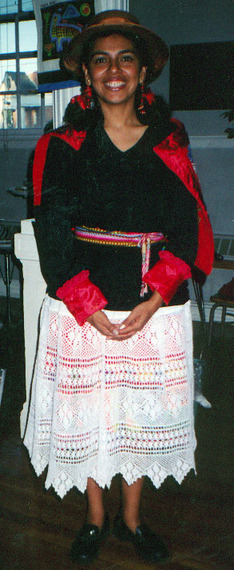It has been five years since this essay was first published. Since then, one event has prompted me to post this updated, edited version: the arrival of our son.
The Princess
"Are you from royalty?" my next-door neighbor inquired with a smile on her face during a neighborhood barbeque several summers ago.
"What do you mean, Betty?" I replied almost immediately, trying not to look puzzled by her question.
"Well, Anna, you carry yourself so nicely and are so well-spoken that I thought you might be part of a royal family," Betty explained as I tried to contain my laughter.
As tempted as I was to concoct a story about my ties to Peruvian royalty (claiming to be a direct descendant of the Incas sounded particularly alluring), I resisted and told her the truth: I was just an immigrant, born in Perú, who ended up in Boston via New York City 30-plus years ago.
Betty's interest in my background sparked a sense of curiosity of my own: What gave her the idea that I could come from royalty? My self-assured demeanor and quiet disposition? Other neighbors also exhibited nice manners, and I did not suspect them of having a regal connection. Could it be that Betty's question represented what other suburbanites thought of us Latinos, that unless we came from privilege, we could not speak well, get an education and live in the suburbs? This experience made me realize how prevalent Latino stereotypes still are. Somebody had to challenge these assumptions. It was virgin territory, and it was mine for the taking.
The Promoter
The town where I live has a population of approximately 30,000 people. According to the latest census figures, less than 1 percent of the residents identify as Hispanic or Latino. That is roughly 300 out of 30,000 people. The animal kingdom provided more diversity, though. Deer, wild turkeys, raccoons, rabbits, and a family of woodchucks are part of daily life. Meanwhile, the only people that look like me in town are the baggers and cashiers at the local supermarket and the teams of cleaning ladies who keep their heads down until they spot me and then do a double take.
Determined to find other Latinos who live in town, I started to frequent the local coffee shops and drug stores. My mission yielded zero results. All I received were long stares and curious looks. I kept wondering what could be so intriguing about me -- aside from the difference in skin color -- that made people stare. Was it such an anomaly to see a brown woman at the local Starbucks reading The New York Times?
In my quest to change perceptions and build community, I came across the town's Human Rights Committee. Timing was on my side. The committee was in the midst of organizing a series of events to celebrate world cultures, so I volunteered to give a presentation about Latin America and Latinos in America. Two hundred people crowded a church hall as I, dressed in a peasant costume from my native Perú, introduced the audience to the richness of the Latino heritage. They learned about the marriage of cultures among the European, Indigenous and African peoples under one idiosyncrasy, three languages and many shades.
The Parent
The arrival of our son in 2008 added another layer of complexity to my adventure as a Latina in the suburbs, as he resembles me (brown/black hair and eyes and a medium-dark complexion), not my husband, who is white (of Irish and Scottish background).
Our son is oblivious to the stares we receive when we go out as a family. I try hard not to see elements of microaggressions in every interaction we have with those we meet, like the subtle inquiries about the type of work I do (translation: How did you end up here?), or the overeager expressions of friendliness that, frankly, feel fake and rehearsed.
It would be easy to point fingers at them -- white people in the suburbs -- as the only ones with a bias. But we brown people do it too. One of my recent adventures happened right at home. A man -- a Guatemalan, I found out -- came to deliver and install a microwave oven. When I saw him, I asked if he spoke Spanish. After he said yes, we exchanged the usual information among immigrants: country of origin and number of years in the U.S. His next question made me smile: "So how long have you been working in this house?" I said, "Fourteen years," referring to the number of years since we'd moved in. My husband, who happened to be working from home, came to the kitchen to see the new appliance. The man gave me a look that said, "You are not the maid!"
I have come to terms with being the other in the suburbs. Sometimes I may be perceived as royalty, other times as the cleaning lady. It does not matter. Part of my adventure as a Latina in the suburbs allows me to strengthen my sense of self while I continue this exploration as a brown woman with a new partner in crime: my son.
Portions of this essay were published in Changing Course: ALANA Anthology 2009 (Harvard Graduate School of Education, 10th Edition).

